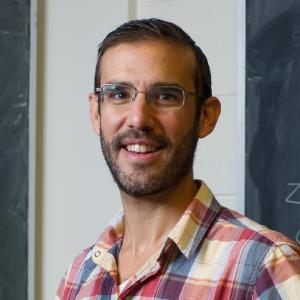Notes from the Director, Fall 2017

Joshua Weitz
Reflections at the start of the 2nd year of the QBioS Ph.D
One, two, three, infinity. You may recall that sequence from classes on mathematical induction. It has a certain ring of truth from where I sit, reflecting on the first year of QBioS while looking forward to the second and beyond. But the truth is more interesting than that and each year presents new challenges and unique opportunities.
The good news is that we have wrapped up a busy and exciting first year of the Quantitative Biosciences Ph.D. at Georgia Tech. The inaugural cohort of nine QBioS Ph.D. students are now embedded in research groups, spanning the Schools of Biological Sciences, Physics, and Mathematics. And, we have already welcomed a new cohort of seven Ph.D. students who arrived to campus in August from the United States, China, and India. These students are ready to take on the challenges of Quantitative Biosciences. Altogether this group of 16 students represents exactly the kind of curious, interdisciplinary researchers we had hoped to recruit.
The first year of QBioS was marked by the introduction of multiple, programmatic innovations. Crucially, we launched a new program of study, including the cornerstone class: Foundations of Quantitative Biosciences. The course includes three hours of lecture and three hours of a computational laboratory focusing on quantitative reasoning in the life sciences given uncertainty. The students worked on rigorous approaches to characterize the nature of evolution, gene expression, signaling, collective behaviors, population interactions, and more. Based on feedback, we are in the process of translating the computational laboratories into multiple computer languages to provide multiple access points for current and future cohorts.
The Foundations course also catalyzed a new outreach activity: an intensive, hands-on QBioS modeling workshop. The first hands-on workshop took place in May 2017 and was attended by approximately 30 students and faculty from Georgia Tech and Spelman College, some with no prior programming experience. Lead instructor Weitz worked with the inaugural cohort of QBioS to organize the workshop, prepare materials in both MATLAB and Python, and teach students the biological context and core methods to simulate stochastic gene expression and variation between genetically identical cells. The two-day event was made possible by support from GT’s Innovation in Graduate Education fund and from the Burroughs Wellcome fund.
These catalytic activities also formed the basis for efforts to provide continued support for QBioS activities. I am pleased to announce that QBioS received funding from GT-FIRE and Georgia Tech’s Strategic Plan Advisory Group for activities in 2017-2018. The second year cohort will jointly organize another hands-on modeling workshop in Spring 2018. In addition, the hands-on course materials will form the basis for an “international” hands-on workshop, with more details forthcoming. Finally, we intend to invite multiple QBioS speakers to campus in Spring 2018 for student-centric visits. Key to these visits will be informal, public discussions on “making the paper”, i.e., helping our community understand not only the results of interdisciplinary research but the methods and stories that underlie science at the interface.
To all returning members of QBioS and to the many new faculty and students, I look forward to working with you towards a fulfilling 2nd year for the QBioS Ph.D.
Best wishes,
Joshua Weitz
Professor of Biological Sciences
Director of the Interdisciplinary Graduate Program in Quantitative Biosciences
Georgia Institute of Technology
Atlanta, GA, USA
